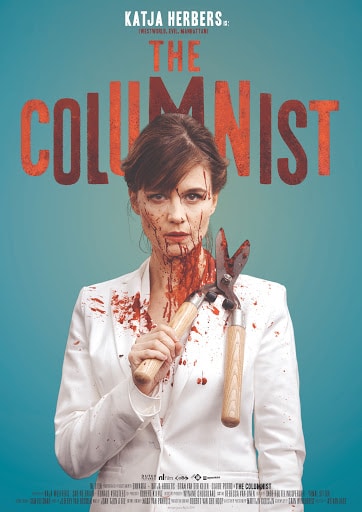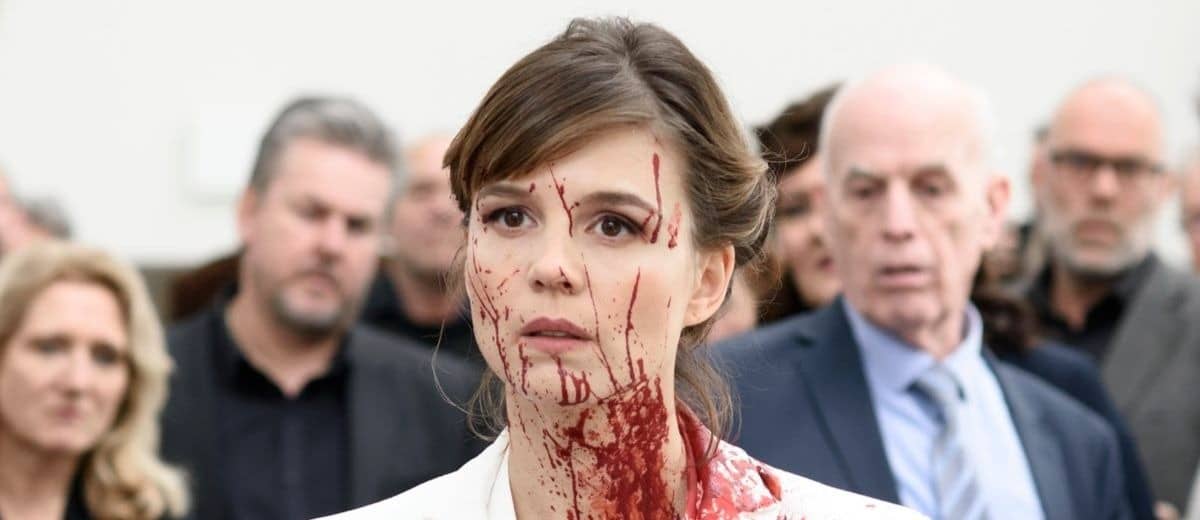
Social media, being a hellworld of our own making, is inevitably creeping into horror cinema; The Columnist (2019) is unusual, however, as it focuses on the implications of online trolling before riffing on what for many people is probably pure wish fulfilment – finding and punishing the worst offenders. In this regard, it mixes social media with elements of the slasher: that’s not to say it doesn’t have some heart, too, and a few bigger ideas to ponder.
Journalist Femke Boot (Katja Herbers) writes a column in a Dutch newspaper; as a woman who – let’s be frank – is no stranger to an inane column or a high internet presence, she receives more than her share of vile internet comments. Art imitates life, so the most vitriolic of these appear after she writes a column imploring people to be a bit nicer. She decides to call it a day, making the decision to – ulp – get off Twitter altogether. Meanwhile, her literary agent is concerned that there’s just not enough of a ‘buzz’ around Femke to generate interest in her upcoming book. She is told to crack on with it regardless, but she is clearly hitting a bit of a professional impasse. Even her teen daughter Anna (Claire Porro) is reading professional rival Stephen Dood’s books now – that’s ‘Stephen Death’ in English, with Mr Death himself a bit better-versed in separating his persona from his personhood. Before long, the frustrated Femke is back to poring over savage internet comments, to the exclusion of a lot else.
This situation tips over from ‘annoyance’ to ‘opportunity’ when she recognises the gurning userpic attached to one of the worst attack-dog profiles: it’s her new neighbour, Arjen, who has thus far seemed pretty reactionary but otherwise a reasonable enough bloke. The first warning sign that Femke is about to take a turn for the worse is when she decides to hack down his brand-new fence. But, things escalate, and when she spots him doing some work on his roof, she cannot resist making him pay a bigger price…
Whilst the sudden escalation into violence is a rather jarring turn given the careful realism of the characters to this point, it does at least establish the film’s central tenet: if you can find some way of exorcising your demons, then you can get along a lot better. Or maybe it’s just a horrible warning about reading the bottom half of the internet? Still, with Femke getting it out of her system, she can now focus on her writing and begins making good headway. Alongside her new mojo is a new relationship – again, our Stephen is quite a nice fella outside of his gothy persona – and a newfound, improved relationship with Anna. The question is obviously – how long can this last, and what will be next?
It’s certainly true that people in the public eye get all manner of absurd, cruel and unnecessary bile hurled at them, and The Columnist is on-the-money with this – there does seem to be a peculiar subset of men out there who will reply to literally anything an uppity woman says online by avowing that she’s too ugly to sleep with, as if this was ever an option theirs to refuse in the first place – but whether the film is actually critiquing this, or the ways in which people fixate on it, is a tad less clear; there’s no reason it can’t be obliquely about both of those things, of course, as it’s her tendency to get strung out by commentators which hamstrings Femke’s ability to work, but then she becomes arguably a hell of a lot worse than her detractors by, well, maiming and killing them. That’s another interesting thing here: whilst some of the Twitterers she catches up with seem authentically unpleasant, others amongst them are…not so bad. Again, there’s that disconnect between real life and online life, but it reminds us that most of the guys furiously typing ‘choke, bitch’ probably have unremarkable, largely inoffensive lives. Not only that, but they have family and friends. When Arjen’s wife and young son watch the hearse roll away and Femke’s response is cold at best, it shows the horrors which are possible when finding it possible to excuse injury to everyone else.

You could choose not to engage wholesale with any of that, mind (though it would take a little of the belligerence on display in the plot) and see this simply as a decent film with some plausible, often likeable characterisation, all wrapped up in some grisly tableaux. Still, things get undeniably darker as the film progresses towards its conclusion, and as much as anything else the ending is sad – it’s about people’s lives breaking apart, and a short-lived happiness which allows you to infer far greater sadness coming after the credits roll. It was always going to come unstuck: a grim, but visually-appealing ending moves the worst violence off-screen finally, but you are left in no doubt.
It doesn’t try to be exhaustive, it doesn’t necessarily hold up greater truths, but The Columnist meshes current issues and concerns with a kind of gore vibe which is either cathartic or cautionary, depending – I’m sure – on who you ask. Overall, it’s a satisfying and worthwhile watch,
The Columnist appeared at the Fantasia Film Festival 2020.
